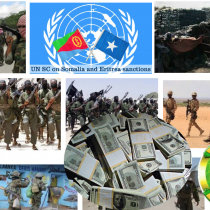ALSO IN THE NEWS

Somalia: Al-Shabaab Mogadishu taxation $10 - $70,000 Monthly - UN Report
Size: 6 MB
28. Over the course of the present mandate, Al-Shabaab continued to impose taxation on the business community in Somalia (see also S/2016/919, annex 1.6, and S/2015/801, para. 92).
Interviews conducted by the Monitoring Group indicate that, in Mogadishu, Al-Shabaab monthly taxation varied from $10 paid by market traders to as much as $70,000 paid by major companies. Federal Government security agencies issued a letter on 23 July 2017 warning the business community against supporting Al-Shabaab financially. Given the limited capacity of Federal Government and security agencies to monitor payments to Al-Shabaab, however, the warning is unlikely to have a significant impact on Al-Shabaab’s ability to collect taxation from the business community.
29.During the previous mandate, the Monitoring Group noted Al-Shabaab’s increasing reliance on financing from the taxation of agricultural production, livestock and trade (see S/2016/919, para. 83 and annex 1.8). Annex 1.5 presents an assessment of Al-Shabaab taxation on livestock and agricultural markets in the Bay and Bakool regions.
30.Al-Shabaab also continues to tax goods at checkpoints along major supply routes, particularly imports and exports along routes to major ports, including goods destined for Kenya. Large trucks are usually taxed $1,000, with receipts issued by AlShabaab to prevent double taxation at subsequent checkpoints.
31.Al-Shabaab justifies taxation of agricultural production and livestock as zakat, a customary religious tax on wealth and property typically collected on an annual basis. The group’s efforts to collect zakat have become increasingly aggressive in terms of the quantity of goods confiscated, the frequency of collection and the coercive methods employed.
Leave a comment
| Copyright © 2009 - 2025 Sunatimes News Agency All Rights Reserved. |
| Home | About Us | Diinta | Reports | Latest News | Featured Items | Articles | Suna Radio | Suna TV | Contact Us |
 0
0 









Somalia: Al-Shabaab Mogadishu taxation $10 - $70,000 Monthly - UN Report
28. Over the course of the present mandate, Al-Shabaab continued to impose taxation on the business community in Somalia (see also S/2016/919, annex 1.6, and S/2015/801, para. 92).